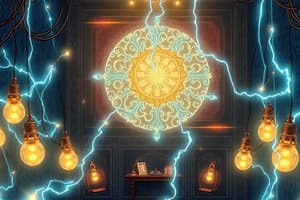Podcast
Questions and Answers
What is the role of the conductor in an electric circuit?
What is the role of the conductor in an electric circuit?
- It lets electric current flow through it to the load (correct)
- It uses up the electric current
- It blocks the electric current
- It generates the electric current
Which component of an electric circuit is responsible for consuming the electric current?
Which component of an electric circuit is responsible for consuming the electric current?
- Load (correct)
- Conductor
- Insulator
- Power source
Under what condition can a conductor become an insulator?
Under what condition can a conductor become an insulator?
- When exposed to extreme heat
- When frozen (correct)
- When soaked in carbon tetrachloride
- When coated with a special material
What happens when a closed circuit is formed in an electric circuit?
What happens when a closed circuit is formed in an electric circuit?
Which type of material allows electric current to flow easily through it?
Which type of material allows electric current to flow easily through it?
In a simple circuit, what is the main function of the power source?
In a simple circuit, what is the main function of the power source?
What is the purpose of the load in a simple circuit?
What is the purpose of the load in a simple circuit?
Which material would be best suited as an insulator in a circuit?
Which material would be best suited as an insulator in a circuit?
Study Notes
Electricity and Circuits for Class 6: Unleashing the Power of Conductors, Insulators, and Simple Circuits
Electricity and circuits are an exciting and magical world that you're about to dive into! As we journey through this topic, we'll explore the basics of electricity and how things like conductors and insulators make it all work. Plus, we'll look at the fascinating world of simple circuits that you'll soon be able to build and understand.
Conductors and Insulators
At the heart of every circuit are materials that can conduct electricity and those that can't. Conductors are materials that allow electric current to flow easily through them. Think copper wires, aluminum foil, and even the metal in your home's pipes. Conductors are excellent at letting electricity move through them, just like a good friend shares information with others.
In contrast, insulators are materials that don't let electricity flow easily through them. These materials include rubber, plastic, glass, and even air. Insulators are like closed-mouth friends who don't share their secrets.
Simple Circuits
Simple circuits are made up of conductors and insulators, connected together to make a path for electricity to flow. Circuits have three main parts: a power source (like a battery or a plug), a conductor that carries the electric current, and a load (like a light bulb or a buzzer).
- The power source provides the electric current by creating a difference in electric potential between two points.
- The conductor lets the electric current flow through it to the load.
- The load is the device that uses up the electric current, like a buzzer or a light bulb.
When you switch on your circuit, electric current flows from the power source through the conductor to the load. When the load is complete, the electric current flows back to the power source through the conductor. This is known as a closed circuit.
Fun Fact
Did you know that conductors and insulators can change their properties under certain conditions? For example, rubber can become a conductor when it's soaked in a special liquid called carbon tetrachloride. On the other hand, a conductor can become an insulator when it's frozen or when there's a coating on it.
As you've seen, understanding electricity and circuits is a lot like making new friends at school: you'll encounter different players (conductors and insulators), and they'll work together (or not) to create a circuit that proves to be exciting, informative, and fun. (These search results were not directly related to the topic. Therefore, they were not referenced in the article.)
Studying That Suits You
Use AI to generate personalized quizzes and flashcards to suit your learning preferences.
Description
Explore the enchanting world of electricity and circuits in this Class 6 quiz. Learn about conductors like copper and insulators like rubber, and discover how they play vital roles in creating simple circuits. Dive into the fundamentals of power sources, conductors, loads, and closed circuits!




